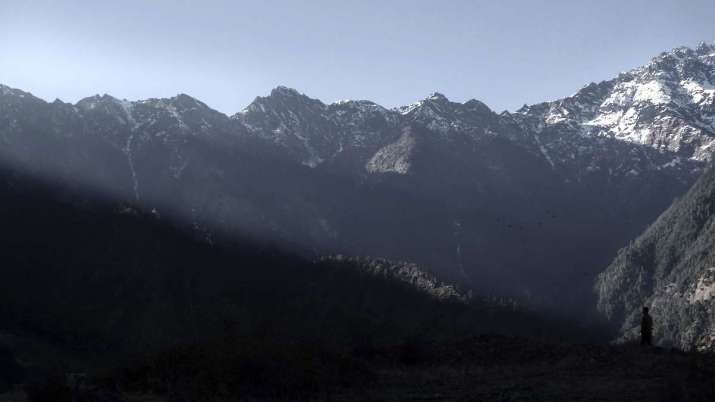
I was so young. Impossibly young when I think about it now. And yet I was convinced that I had already lived lifetimes.
I was in my early 20s and had spent nearly a year wandering around Nepal. I was on my way home (my visa had long since expired, so I had no choice), but decided to make one last stop before my feet were torn from South Asian soil. With romantic idealism, I boarded a bus bound for Dharamsala and drove through the mountains all night long. I don’t remember falling asleep, but I remember waking up to the rising sun. Tibetans were fingering their malas as they chanted their way toward our destination. Giant prayers were carved into the rock walls. I felt like I was in another world.
I settled into my new home with enthusiasm. I signed up for Tibetan study classes at the library, met up with friends, developed a pleasant backpacker’s routine.
One morning, a local made me an offer I had not expected.
“Did you know the Dalai Lama has his own private divination master?” he asked.
“A divination master?” I asked. “What’s that?”
“Someone who can read your future. Want to meet him?”
I shrugged. “Sure.”
“Great. Make sure to think of a good question,” he replied as he hopped away to make the necessary arrangements.
A few days later, I was standing at the door with a kata in my hands. Someone ushered me in and closed the door behind me.
“What’s your question?” the enthroned monk asked without much formality.
I hadn’t actually prepared a question. I had tried, but after racking my brains for a few days I was still stumped. What was I supposed to ask? I had no idea how any of this worked, no sense of the history, the tradition, the details. I was just floating through.
I searched through the contents of my mind and finally pulled out the one question I really had.
“What’s going to happen to me when I get home? I’ve been away for a long time. Will I be ok?”
He sighed. Looked annoyed actually and signaled to his interpreter that she provide me with better instructions for the process.
“It doesn’t work that way,” she explained. “You need to ask something specific.”
“Oh,” I mumbled. “Sorry.”
Something specific . . .
“Ok . . . so I have two real interests. Do I continue my love of mountains and become a mountain climber? Or do I become a writer?”

So there I was, a young white woman asking a high-ranking Tibetan refugee (who I would normally never have access to) what career path I should pursue. I believed that I had the world as my oyster and I was asking him, a refugee (granted, a distinguished, well-respected, and enthroned refugee, but a refugee nonetheless), about the choices I was convinced were mine to make. What must he have thought of me? I hope he felt some kindness, maybe even curiosity, but I would certainly forgive him if he was exasperated.
If he was exasperated, he didn’t show it. I had a question he could work with and he took it seriously. He pulled out his dice and began a ritualistic process he did not explain. He put the dice into a box, shook them around, poured them out, and then repeated. I was mesmerized and confused and so deeply unsure of myself.
Finally, he looked up.
“You will become a writer,” he said. “You must not become a climber. If you climb, you will get hurt.”
I asked a few more questions (technicalities about how to go about it) and he patiently answered them, but my future had been determined (in a nutshell). I could not become a climber. But I would become a writer.
To be honest, I was secretly relieved. I loved the mountains and was always happiest when I was lost inside them, but I couldn’t quite imagine facing my parents with the decision that I would take up climbing seriously. We had lost two cousins to climbing when I was younger (two brothers, who were attached to each other when the rope snapped). Becoming a writer sounded much better.
I stepped out of the room and meandered my way back home, immersed in my thoughts, wondering what it all meant. Wondering if I believed any of it. If I believed him. And if I did, how such a career would ever materialize. I didn’t even know why I wanted to be a writer. I was never particularly good at it. I hadn’t spent my youth scribbling furiously in a notebook (the impression I had of writers at the time). And yet, for some reason, at that moment, I was sure that that was what I wanted to “be.”
I made it back to North America and eventually found my footing by pursuing a traditional academic path. I published my first book and then a second. And eventually even more. But I never quite felt like a writer. Academic writing never felt like the same thing. It was not what I meant when I had said that I wanted to be a writer. Academic writing was more of a job requirement. A skill that I have been trained for. Each piece a pedagogical offering. But is it writing the way I imagined it? Not exactly.
Then one morning, I decided to write a novel. And when I wasn’t looking, the novel was done. When the book came out and I held it in my hands, I remembered that strange (orientalist) and naive experience from all those years before. I heard his voice in my head. “You will become a writer.”
I guess he was right.








